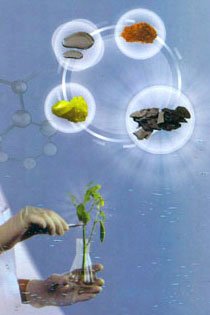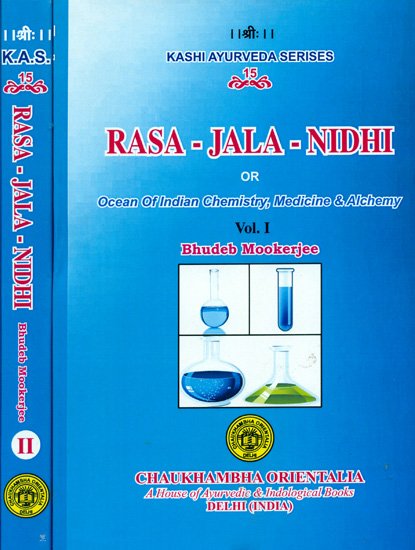Rasa Jala Nidhi, vol 5: Treatment of various afflictions
by Bhudeb Mookerjee | 1938 | 63,627 words | ISBN-10: 8170305829 | ISBN-13: 9788170305828
This fifth volume of the Rasa-jala-nidhi deals with the symptoms, treatment and dietary prescriptions of various afflictions. For example, ratapitta (haemoptysis), cough, asthma, tumours and obesity are dealth with and various Iatro-chemical recipes are provided for these diseases. The Rasa-jala-nidhi (“the ocean of Iatrochemistry, or, chemical me...
Chapter 19 - Symptoms and Treatment of Daha (sensation of heat)
Its variety and indications:
(1) Sensation of heat (daha) due to drinking of alcohol:—The pitta or natural heat of the body, increased by drinking of alcohol in excess, spreads through blood and pitta, and thus affects the skin. Treatment of this disease in like that of pitta.
(2) Sensation of heat due to an abnormal excess of blood, all over the body:—Such an excess of blood causes a sensation of heat. The patient, in such cases, generally sits down, getting always thirsty. His limbs and especially the mouth smell like blood (or aguru), and he feels that he has been surrounded with fire. Such a disease is to be treated in the same way as fever due to an excess of pitta.
(3) Sensation of heat, due to suppression of thirst;—Suppression of thirst is followed by the diminution of the watery portion and the consequent increase of heat in the system, which gives rise to a burning sensation, both internal and external. The patient, in such circumstances, becomes distracted, his throat, palate, and leaps dry up, and he quivers with his tongue coming out of the mouth.
(4) Sensation of heat due to the stomach being filled up with blood caused by hemorrhage: Such a sensation of heat is pacified with much difficulty.
(5) Sensation of heat due to the loss of the dhatus (viz. chyle, blood, semen, flesh, hone, marrow, and fat) may give rise to loss of consciousness, thirst, lowness of voice, inactivity, and excessive weakness.
(6) Sensation of heat due to the “marmas” or vital parts of the body (such as the head, heart, etc.) being smashed or seriously injured: Such a sensation cannot be pacified.
A patient is to be given up as hopeless, if he suffers from any kind of sensation of heat while his skin becomes cold.
Treatment of Daha: Simple remedies.
(1) The body of the patient should be smeared with a paste prepared from (a) fried and powdered barley mixed with clarified butter previously rubbed for hundred times with water, or from (b) pulp of badari fruit and amalaki pestled with dhanyamla (see page 379, Vol. III). Suitable medicines should also be prescribed for internal use.
(2) The patient should lie down upon beds covered with the leaves of lotus or plantain (banana), and be fanned by means of a palm-leaf fan, sprinkled with sandal-paste.
(3) The patient should take a bath by immersion of the whole body in a tub filled with cold water.
(4) Daha is pacified by drinking any of the following:—(a) juice of the flowers and tubers of lotus; (b) water in which lotus flower has been immersed for some time; (c) sugar dissolved with water; (d) cold water; (e) cold milk, (f) juice of sugar-cane. All the processes for pacifying pitta may also be resorted to.
(9) For the purpose of pacifying daha and trishna (thirst), only cold water (and not hot water) is to be used in wetting and smearing the body, taking baths and dips, and sprinking on fans.
(6) (a) Smearing the body with clarified butter, rubbed wtth water, for hundred times, pacifies daha very quickly, (b) The same purpose is served if the body is smeared with froth arising out of the juice of the leaves of nimba.
(7) Fever with sensation of heat is pacified by smearing the body with the tender leaves of palasha or badari or nimba, pestled with some sour vegetable juice.
(8) Daha is pacified by smearing the body with a paste made of amalaki; fried with, clarified batter and pestled with some soar vegetable juice.
(9) Juice of the kernel of matulunga mixed with honey and rock-salt is to be applied on the crown of the head in the case of the dryness of the tongue, palate, throat, and the alimentary canal.
(10) Daha is pacified, if the body of the patient is covered with cloth wet with butter-milk prepared from cow’s milk or with kanji (see page 384 vol. III).
(11) Sensation of beat is quickly pacified if the patient is made to lie down with his face kept upwards with a deep vessel made of copper or bell-metal placed upon his navel, and cold water poured profusely into the vessel.
(12) The sensation of heat felt in fever due to pitta is pacified by cooling actions (Such as application of ice-bag on the head, etc).
Iatro-chemical remedies.
Dahantaka rasa.
Five parts of purified mercury and one part of thin copper foil (or fine wires of copper) are to be rubbed together with lime juice, and made into a lump, which is to be coated all round with a paste made of five parts of sulphur, pestled with the juice of betel-leaves. The lump is then to be dried and heated by Bhudhara-yantra (see page 262, vol. I), till the lump is reduced to ashes. This medicine cures daha and loss of consciousness due to pitta, if taken in doses of two raktis, each, with a few drops of honey, a little of ginger juice, and a little of powdered trikatu.
Sudhakara rasa.
Equal quantities of rasa-sindura, mica, gold, and pearls are to be rubbed together, for seven times, each, with the decoction of triphala and juice of the roots of shatavari. Pills are then to be made, one rakti in weight, each, to be dried in the shed- If taken with suitable adjuncts, this medicine cures daha, prameha (spermatorrea), and vata-rakta (a kind of leprosy). It increases strength and semen.
Diet and deeds salutary in daha:—
Shali rice, shasti rice, mudga grams, masura grams, chanaka grams, barley, soap of meat of game fowl, fried paddy divested of bosks, and then powdered or made into a paste; sugar, clarified butter robbed with water for a hundred times, milk, fresh butter prepared from milk direct, kushmanda, karkata, banana, panasa fruits, sweet pomegranates, bimbi, alabu, green cocoanut and its water, dates, dhanya, madhurika, green palm fruit, peala fruit, shringataka, kaseru, madhuka (mahua) flower, balaka, baritaki, all sorts of bitters; cold unguents, etc, living in under-ground rooms (in hot weather), wetting the body with cooling liquids, anointing the whole body with medicated oil, or oil prepared from cocoanut or sesamum; taking dips in cold water; lying down on beds covered with the leaves of lotus or water lily or with silken bed cloths. Resorting, in day times, to cold forest, hearing of amusing talks, songs, exposure to cold, hearing of sweet words, smearing the body with a paste or decoction prepared from ushira or with sandal paste; cold water, cold wind, living in a room cooled with the sprays of water coming out of a fount, touch of dear wife, good water, camphor, exposure to the rays of the moon, taking baths, wearing of gems, taking sweets, and other things calculated to pacify pitta.
Diet and deeds injurious in daha:—
Food and drinks incongenial by combination (see page 9, vol. IV), anger, suppression of calls of nature, riding on back of horses or elephants, walking, taking alkalis, things which increase pitta, physical exercise, exposure to the rays of the sun, butter-milk, betel leaves, honey, hingu (asafoetida), sexual intercourse, pungents, acrids, and hot food.
Conclusion:
 This concludes ‘Symptoms and Treatment of Daha (sensation of heat)’ included in Bhudeb Mookerjee Rasa Jala Nidhi, vol 5: Initiation, Mercury and Laboratory. The text includes treatments, recipes and remedies and is categorised as Rasa Shastra: an important branch of Ayurveda that specialises in medicinal/ herbal chemistry, alchemy and mineralogy, for the purpose of prolonging and preserving life.
This concludes ‘Symptoms and Treatment of Daha (sensation of heat)’ included in Bhudeb Mookerjee Rasa Jala Nidhi, vol 5: Initiation, Mercury and Laboratory. The text includes treatments, recipes and remedies and is categorised as Rasa Shastra: an important branch of Ayurveda that specialises in medicinal/ herbal chemistry, alchemy and mineralogy, for the purpose of prolonging and preserving life.
